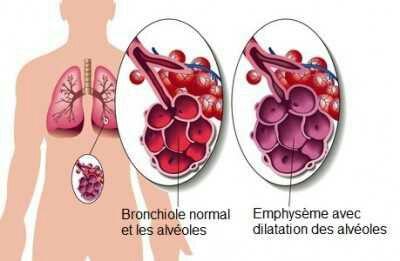Pulmonary emphysema is a disabling lung disease. It is characterized by the progressive destruction of the pulmonary alveoli, small spaces located at the end of the bronchioles allowing the absorption of oxygen. During this disease, the alveoli dilate and eventually lose their elasticity. They become unable to expel the air they contain during the exhalation phase. The destroyed lung distends, increases in volume, which compresses the rib cage and the respiratory muscles, preventing the complete expiration of air. Eventually, without treatment, respiratory failure sets in and becomes extremely debilitating.
Pulmonary emphysema is mainly caused by smoking, but exposure to chemical substances can also be responsible.
According to science there is no cure for pulmonary emphysema.
We have a very effective natural herbal remedy that can gradually regenerate your alveoli and permanently cure you of pulmonary emphysema: CLICK HERE TO GET IT.
Pulmonary emphysema is a chronic disease that can be difficult to control. People can reduce their symptoms at home by using some home remedies, including exercise, breathing techniques, dietary supplements and essential oils.
Natural Herbs, Remedies and Tips for Avoiding/Relieving Pulmonary Emphysema
Quit smoking
Smoking is the main cause of pulmonary emphysema. Tobacco smoke irritates the airways inside the lungs. The inflammation and blockage of the airways causes them to narrow, making it hard to breathe in and out.
People with pulmonary emphysema who smoke have a more rapid decline in lung function, more complications and a higher risk of death.
Smoking can also reduce the effectiveness of inhaled steroids that doctors use to treat severe forms of pulmonary emphysema. Quitting smoking is the most effective step a smoker with pulmonary emphysema can take to slow the progression of the disease.
Improve the air quality in your home
Certain chemicals in our homes, such as paint, cleaning chemicals, pesticides, tobacco smoke, dust, pet dander, etc., can make it difficult for people with pulmonary emphysema to breathe.
However, we can improve the air quality in our homes by limiting contact with household chemicals, opening windows to increase air circulation, using an air filtration system, cleaning air filtration systems regularly to prevent the growth of harmful molds and fungi, vacuuming and tidying to prevent dust accumulation, and washing bed linens weekly to reduce dust mites.
Practice breathing exercises
Breathing exercises are designed to improve the symptoms of pulmonary emphysema by strengthening the respiratory muscles and improving one's ability to exercise.
Some breathing exercises: yoga, pursed lip breathing, diaphragm breathing, apnea, ...
We have a natural remedy based on natural plants, very effective, capable of gradually regenerating your alveoli and to heal you permanently of the pulmonary alveolus: CLICK HERE TO GET IT.
Control your stress level
Pulmonary emphysema can cause sudden flare-ups of symptoms or exacerbations. Anxiety and depression can increase the risk of flare-ups. By adopting stress management strategies, you will improve your overall health.
Emotional stress can weaken the immune system, which increases the risk of respiratory infections. Mindfulness meditation can help reduce emotional distress.
Maintain a healthy weight
People with pulmonary emphysema who are underweight have a higher risk of mortality than people with pulmonary emphysema who are overweight. People with pulmonary emphysema who are underweight are more likely to experience:
respiratory muscle weakness,
Reduced exercise capacity,
reduced lung capacity.
Building muscle strength
Many people with pulmonary emphysema have difficulty exercising because they have trouble breathing. However, avoiding exercise can make symptoms such as muscle weakness and fatigue worse.
Here are some exercises that these people can do to improve their muscle strength and increase their exercise capacity:
Interval training: This involves alternating periods of high and low intensity exercise.
Strength training: Uses resistance methods such as weights, resistance bands and your own body weight to increase muscle size and strength. Strengthening lower body muscles can help improve shortness of breath.
Water exercise
People with pulmonary emphysema may have muscle or bone problems that make exercise difficult.
Exercising in water puts less strain on the body, which may make it easier to manage.
Vitamin D
Many people with pulmonary emphysema have low vitamin D levels. Vitamin D deficiency can increase airway inflammation and reduce the body's ability to clear bacteria. This is related to the fact that these people are more likely to get upper respiratory tract infections, which can make the symptoms of pulmonary emphysema worse. Colds can trigger flare-ups of pulmonary emphysema.
Your doctor may want to check your vitamin D levels and suggest supplements if your levels are lower than normal.
Coenzyme Q10 and creatine
Coenzyme Q10 (CoQ10) and creatine are natural chemicals that help provide energy to the body's cells.
People taking creatine and CoQ10 supplements improved their exercise tolerance, were less out of breath, had improved flare-ups, as did their quality of life.
Eucalyptus oil
Eucalyptus oil contains a natural compound called eucalyptol.
Eucalyptol may have the following benefits for people with pulmonary emphysema:
has antioxidant and anti-inflammatory properties
opens the airways in the lungs
reduces mucus production
helps clear mucus from the lungs
prevents moderate to severe pulmonary emphysema flare-ups.
Standardized myrtol
Standardized myrtol is an essential oil derived from pine, lime and eucalyptus.
Standardized myrtol is a safe and effective treatment for chronic bronchitis and pulmonary emphysema.
Acupuncture
Acupuncture can improve quality of life when given in addition to standard treatments for pulmonary emphysema.
Acupuncture involves using very fine needles to stimulate certain points on the body. It is part of traditional Chinese medicine and is widely available in the United States.
Massage
Massage can help relax tense chest muscles. But there is not enough research to know if massage directly helps pulmonary emphysema. There have not been enough studies on the subject.
However, massage can help with stress and general relaxation. If this is the case for you, you may want to consider it as part of your self-care.
Ginseng
Ginseng is an herb that has been used for thousands of years for a variety of medicinal reasons. Some early, small studies found that ginseng may show promise in treating the symptoms of pulmonary emphysema.
But a more recent, larger study showed that ginseng was no better than a placebo for people with moderate to severe pulmonary emphysema. So it's unlikely that ginseng is helpful if you have pulmonary emphysema.
Salvia
Also called red sage, Salvia miltiorrhiza is an herb that has long been used in Chinese medicine.
Some research suggests that sage may help protect your lungs during flare-ups. But there hasn't been enough research to confirm this. There are no studies that support the use of sage for pulmonary emphysema or any other health problem.
Echinacea tea
Some people take this supplement to help prevent or relieve cold symptoms. Echinacea is an herb that is well known to help boost the immune system, but it is also very effective in relieving inflammation in the body, having an analgesic effect on muscle aches and general discomfort.
Research shows that taking echinacea once you have a cold won't do much to shorten it. But taking echinacea while you're healthy can help you avoid getting sick.
Melatonin
Your body naturally produces melatonin, which promotes sleep. Some people take melatonin supplements when they have trouble sleeping, hoping it will help them get better rest.
If you have pulmonary emphysema, you may have trouble sleeping. Research on the usefulness of melatonin is mixed. Some studies indicate that melatonin makes it easier to breathe and therefore sleep.
Compresses with peppermint tea
This is a very simple, but very effective option for treating fever and providing quick relief, as it lowers body temperature in minutes.
To do this, soak 2 compresses, or a clean cloth, in a container of hot peppermint tea, then squeeze out the excess water. Finally, the compresses or cloth should be applied to the forehead and this process can be repeated several times a day, both in children and adults. In addition to the fact that the temperature of the water helps to cool the body temperature, peppermint also contains substances, such as menthol, that help to cool the skin. Ideally, the tea should not be hot, but it should not be cold either, as it can cause heat shock and make the person shiver, increasing discomfort.
Thyme tea
Thyme is a medicinal plant widely used traditionally for the treatment of cough, and is authorized by the European Medicines Agency as a natural ingredient for the preparation of cough medicines.
According to a 2006 study, this effect seems to be related to the flavonoid composition of the plant, which helps relax the throat muscles responsible for coughing, as well as relieving inflammation of the airways.
Pineapple juice
Due to its composition of bromelain, pineapple juice seems to be an excellent natural option for cough relief, as this substance seems to be able to inhibit coughing.
In addition, because it contains vitamin C, pineapple juice also boosts the immune system and reduces inflammation in the respiratory system, making it a good option for treating pneumonia.
Ginger tea
Ginger is a root that has constituents, such as gingerol or shogaol, with a powerful analgesic and anti-inflammatory action that help to significantly reduce any type of pain, especially muscle aches and general discomfort from conditions such as the flu, cold or pneumonia, for example.
In addition, the phenolic compounds in ginger also have a strong antioxidant action, helping to strengthen the immune system.
We have a very effective natural herbal remedy that can gradually regenerate your alveoli and cure you of lung alveolus permanently: CLICK HERE TO GET IT.
When to consult a doctor
A person should see a doctor if he or she has the following symptoms of an exacerbation of pulmonary emphysema
more shortness of breath
more mucus than usual
yellow, green or brown mucus
thicker or stickier mucus than usual
fever
cold and flu symptoms
increased fatigue
Some signs and symptoms indicate a severe exacerbation of pulmonary emphysema. People should call emergency services immediately if they have the following symptoms:
chest pain
shortness of breath
blue lips or fingers
confusion or agitation
drowsiness
Early treatment of pulmonary emphysema exacerbations can reduce the likelihood of developing other complications.
We have a very effective natural herbal remedy that can gradually regenerate your alveoli and cure you of pulmonary emphysema for good: CLICK HERE TO GET IT.
Order it and start in advance the natural treatment to heal the umbilical hernia. An accompaniment is proposed during all the duration of your treatment. To contact us, click on the WhatsApp button in the right corner of the screen or contact us at +229 99 54 64 63.
We are represented in all African countries and are active in Cameroon, Ivory Coast, Mali, Senegal, Burkina Faso, Togo, Kenya, Nigeria, Gabon, Central African Republic, Benin, Chad, Congo-Brazzaville and Kinshasa. So be sure to receive your products immediately after your order.
Delivery is free of charge anywhere in the world.

